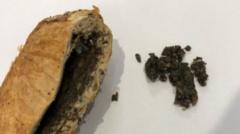The trial, often referred to as the "mushroom murder trial," revealed damning evidence against Patterson, indicative of her meticulous planning. Investigators suggested that Patterson actively searched for lethal mushrooms in surrounding towns and tried to cover her tracks by disposing of critical evidence and providing false statements to the police. Tragically, the victims—her former in-laws, Don and Gail Patterson, both aged 70, and Gail's sister, Heather Wilkinson, 66—succumbed to poisoning shortly after the meal. In contrast, local pastor Ian Wilkinson, Heather's husband, survived after a prolonged hospital stay.
In the aftermath of the verdict, the Supreme Court of Victoria released a trove of over 100 images that were presented to the jury as evidence, some depicting the remnants of Patterson's beef Wellington meal, which had been secured to ensure no contamination contaminated the investigation. These leftovers were critical in confirming the presence of toxic mushrooms.
Death cap mushrooms, known to be among the most poisonous fungi worldwide, were central to the trial. While Patterson claimed she sourced her mushrooms from an Asian grocery in Melbourne, she could not provide specifics. However, investigators traced her internet search history to the iNaturalist website, where she viewed mushroom sightings nearby prior to the fatal incident.
In a further unraveling of her story, Patterson’s attempts to deny ownership of a food dehydrator, which forensic experts linked to the toxic mushrooms, fell apart after evidence emerged of her boasting about it in an online true crime forum. CCTV footage showed her discarding the device days after the incident, drawing the attention of the police, who later found evidence of her fingerprints and toxic mushroom traces on the appliance.
The trial revealed shocking truths reflecting an overwhelming sense of betrayal within a familial context, leaving a long-lasting impact on the community and sparking unease over food safety and the awareness of deadly mushrooms in the area.
This landmark case captures the interplay of crime, deception, and tragedy, echoing through the halls of justice and the minds of those who followed it closely.
In the aftermath of the verdict, the Supreme Court of Victoria released a trove of over 100 images that were presented to the jury as evidence, some depicting the remnants of Patterson's beef Wellington meal, which had been secured to ensure no contamination contaminated the investigation. These leftovers were critical in confirming the presence of toxic mushrooms.
Death cap mushrooms, known to be among the most poisonous fungi worldwide, were central to the trial. While Patterson claimed she sourced her mushrooms from an Asian grocery in Melbourne, she could not provide specifics. However, investigators traced her internet search history to the iNaturalist website, where she viewed mushroom sightings nearby prior to the fatal incident.
In a further unraveling of her story, Patterson’s attempts to deny ownership of a food dehydrator, which forensic experts linked to the toxic mushrooms, fell apart after evidence emerged of her boasting about it in an online true crime forum. CCTV footage showed her discarding the device days after the incident, drawing the attention of the police, who later found evidence of her fingerprints and toxic mushroom traces on the appliance.
The trial revealed shocking truths reflecting an overwhelming sense of betrayal within a familial context, leaving a long-lasting impact on the community and sparking unease over food safety and the awareness of deadly mushrooms in the area.
This landmark case captures the interplay of crime, deception, and tragedy, echoing through the halls of justice and the minds of those who followed it closely.



















